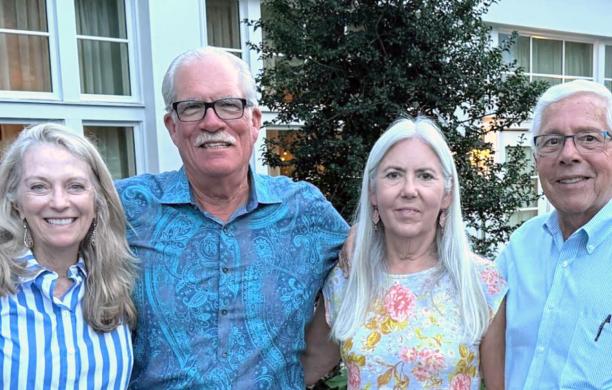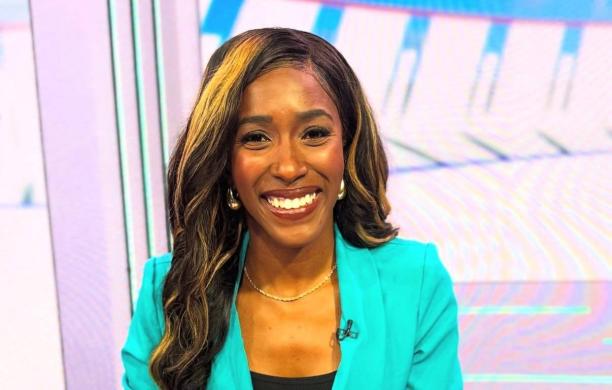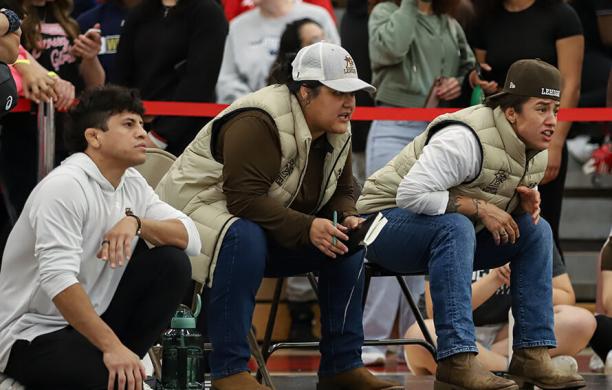Don’t think for one minute that being an octogenarian who lives in The Villages, Florida, has slowed down Karen Adams, former senior associate athletics director.
She still competes (against retirees in their 50s) in The Villages’ Division I sports programs (yes, it has three divisions based on skill).
In her most recent game, she doubled and hit two singles. The win that day came right before her team, called the Free Agents, won first place in the fall softball league.
In addition to that league, she’s also a member of the traveling softball team and the DI volleyball team. And, no surprise, her teams usually win those crowns as well.
While winning is fine, what she really enjoys is the competition, friendships, and activity.
But more than any of those, Adams likes the simple act of being able to play.
At age nine, she was allowed to try out for the local Little League team but not allowed to play with the boys in a competitive sport. Instead, they’d just invite her to the playground for kickball and basketball games.
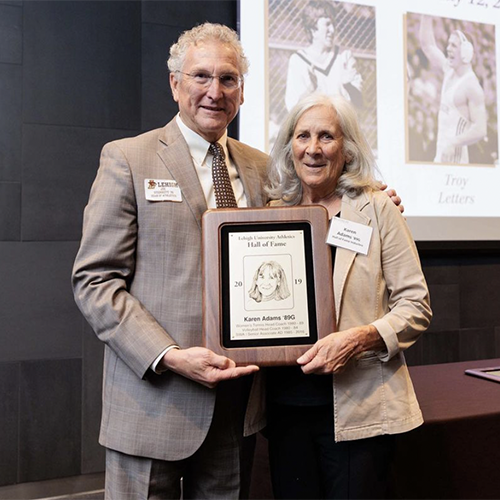 Only when she reached high school was she able to compete on organized women’s teams.
Only when she reached high school was she able to compete on organized women’s teams.
Adams was a three-sport varsity athlete in high school and went on to earn 11 varsity letters (across five eligible teams) in college.
But never did she think, way back then, that today she’d still be playing at such a high level and competing at events like Senior Nationals. Let alone serving as an inspiration to generations of other women athletes. She attributes some of that success to Joe Sterrett ’76, the Murray H. Goodman Dean of Athletics.
Sterrett knows what women athletes have navigated at Lehigh. During his freshman year, 400 women joined the 3,600 men on campus. Over Sterrett’s next three years, 200 more women enrolled each year — a number that has continued a steady ascent until women surpassed men for the first time with the Class of 2027.
He remembers how the university wasn’t truly prepared for that first class in 1972 and continued to reconfigure buildings and bathrooms to accommodate the new students. The athletics department also hadn’t fully planned things out.
At that point, sports teams emerged as women asked for them. But the women’s teams lacked facilities and fulltime staff. The players did their own laundry, supplied their own gear, and, until they got vans, drove their own cars to matches.
“These women were pioneers,” Sterrett says. “They were doing all of this just for the love of the sport.”
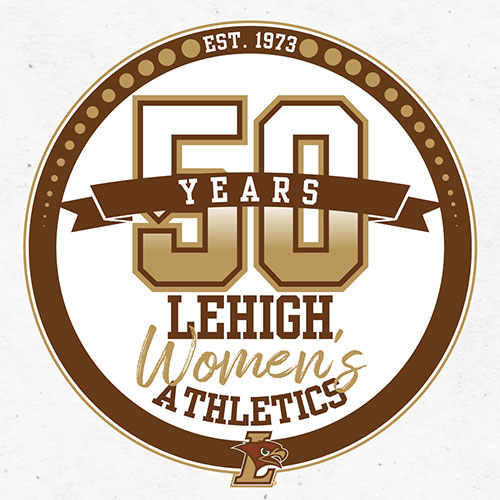 While the institution was under legal obligation to create equity in athletics, it was Sterrett and Adams who helped shape the modern-era athletics department. This year, Lehigh celebrates the 50th anniversary of women in athletics, an important milestone for the program.
While the institution was under legal obligation to create equity in athletics, it was Sterrett and Adams who helped shape the modern-era athletics department. This year, Lehigh celebrates the 50th anniversary of women in athletics, an important milestone for the program.
Adams joined Lehigh in 1980 to coach women’s tennis and basketball. At that point, she was preceded and surrounded by women who had been excited to get the programs started, like Helen Bond Benson, Barb Everhart Lipkin, Judy Turner, Ann “Muffet” McGraw, and Sue Sachs ’77. They all served under the watchful eye of Bill Leckonby, Dick Gibney, and John Whitehead, the athletic directors during those early years.
When Sterrett began his tenure leading athletics, Adams felt a clear shift to better level the playing field for women.
“Joe worked hard, earned respect, and accomplished lots,” Adams says. “He added teams and coaches, upgraded facilities, and built new fields and complexes. Over the years, he added more academic support, community outreach, leadership development, and programs, like sports medicine and strength and conditioning. He wanted to make headway and always supported our work.”
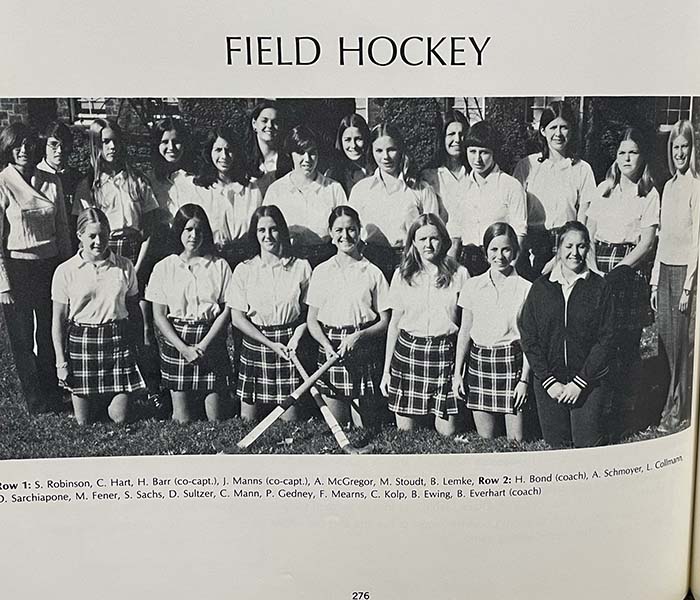
After five years of coaching, Adams rose in rank to assistant athletics director, then associate, and then senior associate. She didn’t just sit over women’s sports but men’s and women’s — a detail not lost on her or others in the emerging field of athletics leadership.
Losing a coach of Adams’ caliber meant needing several people to fill her shoes. One was Sue Troyan G’91. A three-time All-American in track and basketball, Troyan planned to earn her MBA at Lehigh and serve as a graduate assistant basketball coach.
Beyond assisting in a sport she loved, her goal was to graduate and then make money using that advanced degree. Sterrett though had other plans for her.
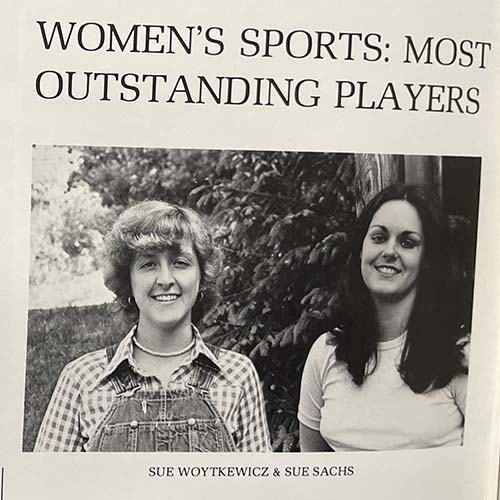 Upon entering Lehigh, she noticed the inequities that Sterrett was determined to correct. The men’s team had a full-time coach as well as a full-time assistant and full-time graduate assistant. The women’s team had just a head coach and Troyan.
Upon entering Lehigh, she noticed the inequities that Sterrett was determined to correct. The men’s team had a full-time coach as well as a full-time assistant and full-time graduate assistant. The women’s team had just a head coach and Troyan.
Adams saw the same.
“Women’s athletics made tremendous progress under Joe,” Adams says. “Some might ask why it wasn’t faster, but change takes time and isn’t easy. If you have enough money, then you can do anything. But we had to do the best with what we had.”
Both women helped shape the vision Sterrett had to expand the program and create equity.
“Joe crafted that vision and then raised monetary support for it,” Adams says.
That vision included single-team coaching duties, adding assistant coaches, creating scholarships, joining a conference, and endowing positions — all necessary in order to be more competitive at the Division I level.
That vision kept Troyan around. Rather than follow her big-money MBA dreams, she took over as head softball coach. Not only was she unfamiliar with the sport, but she also inherited a team of 9 players with a 5-35 record. She begged two women’s basketball players to join the squad and plowed through a season that still had them in last place (10-30).
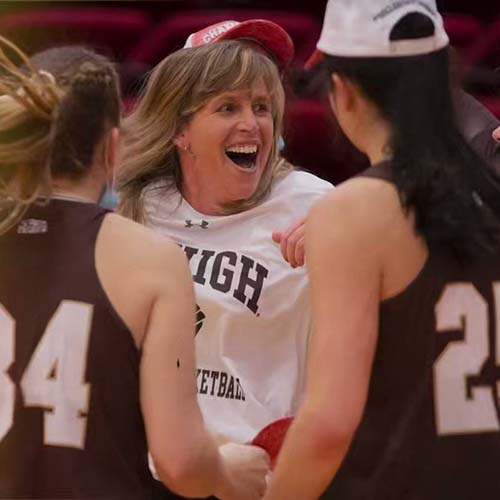 The challenges of that first season brought lots of tears, but Troyan was determined to make the program excel.
The challenges of that first season brought lots of tears, but Troyan was determined to make the program excel.
Using a personal touch to recruit regional talent, she nabbed a bevy of student athletes and went 21-21 (8-4 in league) for second place. The next three years, she followed the same recruitment process and won the league each time.
That’s when Sterrett brought her back to basketball. Again, she inherited a women’s team with a lowly record in the prior season — just three wins. Her skill in recruiting and her passion for basketball almost ensured success. The team was .500 in her second season and won the league in her third.
For 28 years, she led the program to a 430-361 record and four league championships. Sterrett then tapped her again. This time to lead athletic operations as deputy director of athletics.
“While I miss coaching, I can make a broader impact on a place that has given me so much,” Troyan says. “I owe so much to Lehigh and the people here who have been instrumental in my growth and the development of my three children, who all earned Lehigh degrees.”
Development is crucial to Sterrett and the team as they have made it their mission to help student athletes advance their learning, foster personal growth, and develop their skills as leaders. Thus the motto: Learn, Grow, Lead.
For women’s athletics, the national profile is rising as college tournaments are broadcast, 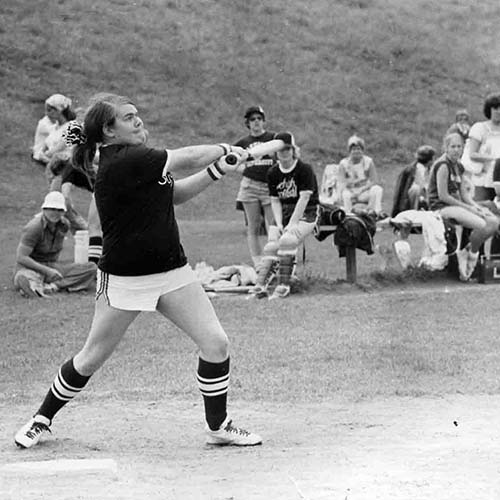 WNBA viewership gains momentum, and the U.S. Women’s National soccer team achieved salary parity.
WNBA viewership gains momentum, and the U.S. Women’s National soccer team achieved salary parity.
“Voice and visibility create more opportunities to celebrate the talents of women as athletes,” says Sterrett. “It’s long overdue.”
He remembers the feats of players like Judy Manns Kirkwood ’75, Pam Watson ’76, Helen Richardson ’77, and Lori Collman Flowers ’78
Over his long career, he has watched them and so many other women don their brown and white uniforms and compete at high levels in front of loyal fans. While the crowds have grown and the names have changed, Sterrett recognizes what this 50th anniversary represents to the women whose passion and sweat have made Lehigh a perennial power both on and off the field of play.
Discover More
Soaring Together

Investing in the Impact of Lehigh Women
Lehigh University is taking action to ensure all Lehigh women — undergraduates, graduate students, and faculty — have every opportunity to achieve their goals. Your support will fuel scholarships, experiential learning opportunities, and more.
